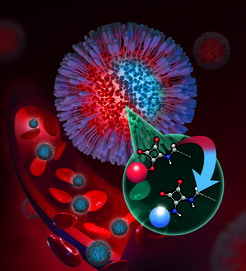pH-degradable, bisphosphonate-loaded nanogels attenuate liver fibrosis by repolarization of M2-type macrophages
Macrophages play an important role in the progression of liver fibrosis. In this paper, biodegradable nanogel particles have been designed to deliver clinically approved bisphosphonates into fibrotic livers and stop disease progression by changing the activity of macrophages.

Liver fibrosis, a consequence of most chronic liver injuries, is still very hard to-treat disease since its progression is mostly supported by a certain types of immune cells, so called M2-type macrophages. However, they can get switched from a profibrotic into a nonfibrotic M1 phenotype. For that purpose we designed a pH-degradable, squaric ester-based nanogel carrier system which enables a selective conjugation of the highly water-soluble bisphosphonate drug alendronate. This drug is originally approved to treat osteoporosis as the drug has an intrinsic affinity to calcium and bone tissues. The covalent delivery system, however, promotes after intravenous administration an efficient delivery to the liver. Here, the bisphosphonate payload reprograms the profibrotic M2- toward antifibrotic M1-type macrophages and consequently, prevents liver fibrosis progression. The alendronate-loaded squaric ester–based nanogels therefore represent an attractive approach for nanotherapeutic interventions in fibrosis and other diseases driven by M2-type macrophages, including cancer.












